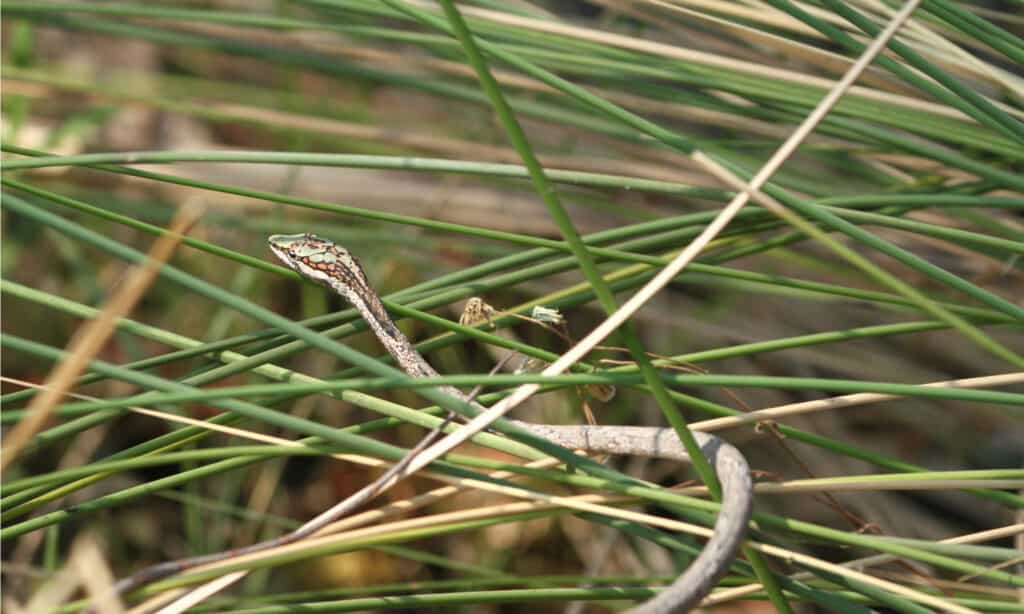Just imagine you are going for a nice hike and the long trail is surrounded on both sides by tall grass. All of a sudden a snake darts out into the path, causing you to jump. Maybe it’s venomous, maybe it isn’t, but for the rest of your hike, you’re going to be very cautious of the grass that seemed very harmless just a few minutes ago. That daydream helps to describe the meaning of the idiom “a snake in the grass.” It means someone who seems harmless but is actually sneaky or nefarious, especially if they are hiding their true nature and waiting for the right moment to strike, just like a snake hiding in the grass.
The Origins of the Phrase “A Snake In The Grass”
This is a very old idiom that has been used for centuries. It was first used by the Ancient Roman poet Virgil who lived between the years 70 and 19 BCE. One of the lines in one of his poems was “latet anguis in herba.” This Latin phrase is usually translated as “a snake lurks in the grass.” In the Middle Ages, the phrase came into the English language, though it was a bit longer than the way we use it today: “Though everything looks clean, a snake lurks in the grass.” Through the years the phrase has become shorter, and today, we just say “a snake in the grass.”

The idiom “a snake in the grass” means someone who seems harmless but is actually sneaky or nefarious and could strike at any moment.
©iStock.com/randimal
Examples of Everyday Use of the Phrase “A Snake In The Grass”
This is a descriptive phrase that can be used in a few different ways. You can use it to describe someone who has negative intentions though they seem harmless. It can even be used as an adjective if you put hyphens in between each word. For example, you can say “a snake-in-the-grass lawyer” to describe a lawyer with treacherous motivations.
You can also use it to describe a situation and not a person. For example, it might be a good description for a business deal with a hidden clause that will be harmful to the seller, or for a political movement that someone thinks has hidden bad intentions.
A Useful Way to Illustrate the Phrase “A Snake In The Grass”
Here is a fictional story that can help you to understand the idiom “a snake in the grass.”
Imagine that you have a friend to whom you told some private and personal secrets. They have been your friend for a long time and you trusted them. However, you found out that not only did they tell your secrets to someone else, but they also judged you harshly for them and gossiped about you behind your back. They seemed to be your friend for years, but at the right moment, they totally turned on you. You could say they turned out to be a snake in the grass.

A modern day example of “a snake in the grass” can be when someone you are close with betrays your trust and turns on you.
©iStock.com/Antonio_Diaz
A Real Life Example From The New York Post
In 2017 the New York Post ran an article about a murder suspect in Ohio, Steve Stephens, who had used a snake to appeal to women. He would use the pet to attract them and seem nice and harmless when really he was a cold-blooded killer. In the article, his neighbor referred to him as a “snake in the grass” because he seemed like a nice, quiet guy, but ultimately was a dangerous person.
Possible Pros and Cons of Using the Phrase “A Snake In The Grass”
Like any idiom, there are some potential pros and cons to using the phrase. The pros are that it is a great way to describe someone or something that seems completely safe, but is actually harmful. The cons are that if you describe someone as a snake in the grass to their face, they will probably take offense to the description. Even if you describe them that way in a closed setting, that statement could get back to them and they would likely not appreciate that. So, you have to be careful who you use the statement towards and in what setting.

If you describe someone as a snake in the grass to their face, they will probably take offense to the description.
©Anders Stoustrup/Shutterstock.com
Idioms With a Similar Meaning to “A Snake In The Grass”
There are a few phrases that have a similar, but slightly different meaning to “a snake in the grass.” Before you use them, be sure you fully understand their meaning!
- Get one over on.
- Do someone dirty.
- A wolf in sheep’s clothing.
- A devil in disguise.
The photo featured at the top of this post is © iStock.com/sdbower
FAQs (Frequently Asked Questions)
What does the idiom "a snake in the grass" mean?
This phrase means someone who seems harmless but is actually sneaky or nefarious, especially if they are hiding their true nature and waiting for the right moment to strike, just like a snake hiding in the grass.
What is the origin of the phrase "a snake in the grass"?
The phrase “a snake in the grass” was first used by the Ancient Roman poet Virgil who lived between the years 70 and 19 BCE. One of the lines in one of his poems was “latet anguis in herba.” This Latin phrase is usually translated as “a snake lurks in the grass.” In the Middle Ages, the phrase came into the English language, though it was a bit longer than the way we use it today: “Though everything looks clean, a snake lurks in the grass.” Through the years the phrase has become shorter, and today, we just say “a snake in the grass.”
What are some phrases with a similar meaning to "a snake in the grass"?
There are a few phrases that have a similar, but slightly different meaning to “a snake in the grass.”
- Get one over on.
- Do someone dirty.
- A wolf in sheep’s clothing.
- A devil in disguise.
Thank you for reading! Have some feedback for us? Contact the AZ Animals editorial team.






